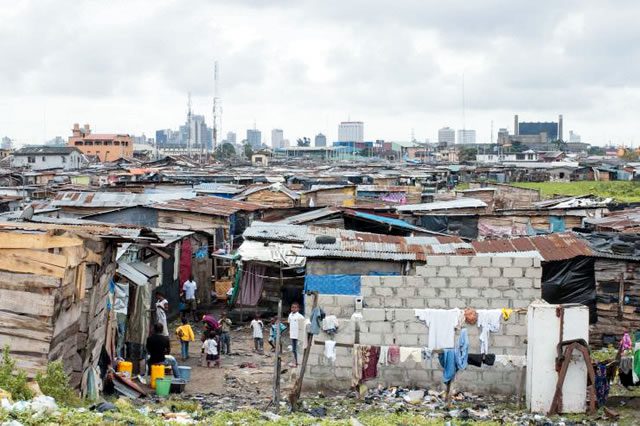Economic Issues
Of Ikoyi Affluence, Obalende Poverty and other Sorry tales -By Udeze Daniel Jr.
In the inns of Obalende, poverty is perceived in terms of perpetual hunger, living in poor housing conditions without water, kitchen and toilet facilities, inadequate income, malnutrition, lack of access to social services, lack of social and political status and being unable to participate with dignity in society.

An estimated 2,000 people enter Lagos every day, many ending up in informal settlements like Obalende. It was founded as an artisan village in the late 19th century, by immigrants from a prominent ethnic group as this remains largely disputed with different understanding emerging. As its population swelled and land ran out, they moved on to the water. Today Obalendeis home to people from a variety of riverine communities along Nigeria’s coast.
The city’s pot-holed roads are choked with traffic, or “go-slows” and it’s not uncommon for workers to spend up to four hours battling to get from home to their jobs in the main central business district.
Ikoyi, however stands out for its luxury and reputation as one of the most amazing places to live in Lagos. The neighbourhood is surrounded by water as it sits on an island. It offers an embrace of style, class and comfort to people looking to settle within the ambience that its homes, estates, streets, and avenues have to offer.
Ikoyi is also home to the famous Banana Island, which Forbes ranks as the most expensive neighbourhood in Nigeria. The district offers upscale living with quality houses and good security. Its top class restaurants, malls, bars, and a rich offering of outdoor activities have made it a prime location for celebrities, upper-class citizens and a long list of prominent personalities.

Ikoyi was once separated from Lagos Island by a narrow waterway that was dug by the British colonial government. This waterway has now been partly built over and filled such that it has become fused with Lagos Island once again. Today, Ikoyi is home to quite a number of government buildings, parastatals, businesses, hotels, restaurants, schools, the famous Ikoyi Club 1938 and the Ikoyi Golf Club. Some of the newer suburbs of Ikoyi include Banana Island, Parkview Estate, Dolphin Estate and other luxurious blocks of flats that are constantly springing up within and around the neighbourhood.
In many of the urban centres of developing countries, a change in lifestyle due to increased affluence has been observed. It has been shown that change in lifestyle is an important factor in the global epidemic of overweight and obesity; Ikoyi also suffers from this paucity as it continues to remain one of the most opulent districts in Lagos with a reputation of secure and luxurious apartments. The district boasts of stunning mansions and dazzling architectural works that spread across the neighbourhood. Ikoyi records the highest amount of rainfall in Lagos and is known to be breezy and cool all through the day. So, if you fancy an evening walk or a morning stroll, you are bound to enjoy the cool breeze. Residents and visitors take full advantage of the serenity in the area to embrace a more healthy lifestyle.
Dubbed as the most affluent neighbourhood in Africa, Banana Island houses the 1% of the 1% ultra-wealthy in Nigeria, making it the richest square metre in Africa. A 1000sqm land in Banana Island costs between N600 to 750 million, the same size of land cost N200 million less immediately you step out of Banana Island gate, and in other parts of Ikoyi, the same land size cost N300 million. Banana Island is home to the wealthy few such as the Adenugas, MDs of Multinationals, Executive Directors, Billionaires and Music Entrepreneur – Davido, to mention a few.
Aside from the fact that lands are limited in Banana Island, leading to an increase in the value of the space, Banana Island has been described by Forbes Africa as the 2nd safest place in Nigeria, second only to Aso Rock. This luxury location is perfect for those who value security and those who are thinking of ROI as the value of properties in Banana Island keep rising.
Also, driving along Bourdillon Road, Ikoyi, it is pretty hard to miss the majesty of The Belmonte. The 20-floor high rise stands tall in one of Lagos’ most exclusive suburbs with its world-class design that marries the look of top-of-the-line buildings in Knightsbridge with classic Lagos opulence. The building was developed by Kuber Developers and blends together stone and glass in its distinctive design which fits right in with the affluence Ikoyi is known for.
Much of the problem in Nigeria stems from a lack of investment in the basic infrastructure that enables a city to function. For decades, corrupt governments — both civilian and military — have enriched themselves on earnings from the country’s vast oil and gas reserves, leaving the majority of the country’s 140 million residents to struggle in poverty.
Obalende shares with Lagos the exceptional situational inventiveness that makes its environs tick. Take the matter of clean drinking water: criss-crossing the lagoon bed are pipes, paid for and laid by enterprising residents to bring in clean water – for a modest fee – from boreholes in neighbouring suburbs.
The population estimates vary widely, from 40,000 to as much as 300,000. “Nobody knows, there’s no credible data available.
Presiding over various parts of the busy makeshift areas are local chiefs.
In addition to electricity problems, Obalende doesn’t have potable water. Most of Lagos’s residents must buy water from street sellers or line up and collect it from shared stand-taps. Some nine out of 10 Lagosians live in a slum, according to the U.N., and less than 1 percent have a flush toilet.
Cell phones are the main means of communication, as there are few working landlines. The postal service barely functions. To receive a letter one must have a post office box — zip codes for residential delivery have never been developed.
Buying and selling of goods, or petty trading, is one of the main ways people eke out an existence. Most people get by on just a couple of dollars a day.
Yet despite all these problems, Lagos continues to grow. Along with a high birth rate, Lagos attracts young people from all over the country, as the city is Nigeria’s driving economic force and offers the promise of success for those willing to try.
In the inns of Obalende, poverty is perceived in terms of perpetual hunger, living in poor housing conditions without water, kitchen and toilet facilities, inadequate income, malnutrition, lack of access to social services, lack of social and political status and being unable to participate with dignity in society.
In this place, about 39% of the poor had no formal education while about 65% either had primary, secondary or tertiary education.
59% of households are either unemployed or self-employed these poor dwellers depend mostly on re-adjusting their expenditure patterns and savings, feeding, clothing and education of children, the majority of the households either fail to save at all or save less than 10% of their income inequality in income or wealth distribution and the existence of different poverty levels are accounted for by unequal opportunities to get the same level of education, the type of occupation of the household head, and partly due to the difference in the number of household size and the number of people working in the household is the salvation of an inner dweller of Obalende.



















